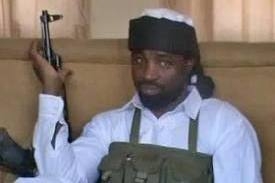


Glowing like a jobless Nigerian youth, who had just landed a job in an oil company, and exuding the confidence of an army general, who had secured a long sought victory for his country over his country’s arch enemy, Alhaji Taminu Turaki, Nigeria’s Minister of Special Duties and Chairman Presidential Committee on Dialogue and Peaceful Resolution of the Security Challenges in the North, spoke to Aso Rock Press Corps on Wednesday July 10, 2013, on the ceasefire deal he said the Nigerian government and the Islamic fundamentalist sect, Boko Haram, had reached. He had announced the deal with the Boko Haram on Radio France International Hausa service on Monday July 8 with someone he claimed was second-in-command to Boko Haram leader, Sheik Abubakar Shekau. But on Saturday July 13, 2013, Shekau not only flatly denied any knowledge of such a deal with Turaki and Turaki’s committee, but also supported the brutal killing of 30 innocent school children and a teacher at the Mamudo Secondary School, Yobe State, on Saturday July 6, 2013, and sanctioned all such acts.
Shekau was very clear in his message spread by the mainstream and social media across the globe, when he said, “Let me assure you that we will not enter into any truce with these infidels. We will not enter into any truce with the Nigerian government. We believe in the massacre inflicted on the secondary school in Mamudo and Damaturu and other schools. We earlier warned that we were going to burn all schools. They are schools purposely built to fight Islam.” With this strong denial by Shekau that he neither knows Turaki nor the purported second-in-command that Turaki touted had the authority of Shekau to negotiate a truce with Turaki’s committee, the wind has blown, and everyone in Nigeria and around the globe can see the rump of the chicken.
Even though Minister Turaki and his committee had since gone into damage control by trying to cast doubt on the authenticity of Shekau’s statement, I still insist that Nigerians and the people around the globe have seen the rump of the chicken after the wind blew. This is because the effusive reaction of the minister when one of the journalists pointedly asked him if Shekau was involved in the ceasefire talks was unambiguous and was carried by the major TV networks in Nigeria with global reach. Everyone who monitored these networks heard Minister Turaki when he said, “When a minister speaks on behalf of the federal government, you wouldn’t say you must see the president or the vice president there. We’ve spoken with somebody who is second-in-command as far as Boko Haram is concerned, and he has informed the media that he has been discussing with us with full knowledge and authority of Imam Abubakar Shekau. So, we’ve no cause to doubt him. We’ve done checks on him just as they (the sect) have done checks on us also, and we’ve realised that yes, we’re dealing with the proper people and with the proper leadership of the organisation.”
If Turaki were to be Japanese, he would be considering the honourable way out, perform hara-kiri. But this is Nigeria; Turaki, along with the members of his committee, will not even resign. And they probably won’t even apologise to the Nigerian people and the international community for that wholesome deceit. It is worrisome when one realizes that someone like Professor Bolaji Akinyemi, a former Director General of Nigeria Institute of International Affairs and Foreign Minister under Gen. Ibrahim Babangida’s dictatorship, is a member of this committee. The Nigerian people and the international community indeed have cause to worry.
Now, a world that already holds the view that Nigeria is a home of all manner of scammers would be gloating about their rightness on this perspective of Nigeria. The critical questions that need to be asked in the face of this twist are: How relevant is this committee on the War on Terror, which Nigeria is clearly fighting? Should the Nigerian people and, indeed, the international community continue to trust this Turaki-led committee? What are the motives for this sort of wholesome deceit? Or are the Nigerian people and the international community going to accept the damage control by Turaki and his committee that is in the works already?
Does this development answer the series of queries, which I posed in my last article, “Ceasefire With Already Degraded Boko Haram: Whose Interest Does It Serve?” and in previous articles on the Boko Haram scourge? Did Turaki and his committee dramatize what the Nigerian people call eye-service, the usual overzealousness of state officials to please at all cost any higher authority that delegates responsibility to them to execute? Could this be done in a matter as serious as the one the committee is handling? Was this done to justify the possible huge resources earmarked and expended for the work of the committee whose duration is 90 days?
The Nigerian people and the international community have been through this rigmarole before. On January 28, 2013, one Sheikh Mohammed Abdulazeez, a self-proclaimed second-in-command to the Boko Haram known jihadist group leader, Abubakar Shekau, declared in Maiduguri their willingness to lay down their arms after a meeting with Borno State governor Kashim Shetima. Like the current scenario, this fellow said he had the authority of their leader, Shekau. However, a few days after his pronouncement, Shekau strongly denied the idea of laying down their arms just like he did on Saturday. And their attacks escalated until the declaration of the state of emergency.
From the beginning, the whole thing smelt like what Mr. Ahmad Salkida called a scandal, in his description of the January incident related above. Mr. Salkida is reputed to be the only Nigerian journalist who had made contact with the Boko Haram leadership. Currently, he lives in Dubai, United Arab Emirate, having fled to Dubai after the January incident. Mr. Salkida said he fled Nigeria because, “After my most recent expose on the scandal going [on] in respect of purported ceasefire negotiated between government and Boko Haram, the danger to my life has escalated to new heights. I have had to go severely underground for several weeks leading to my decision to flee Nigeria.”
On the current “ceasefire”, first, we read that the minister, Alhaji Turaki, said that Boko Haram had signed a ceasefire agreement with the Federal Government of Nigeria. The next day the papers now reported that the government and Boko Haram had reached a “ceasefire understanding” and, of course, the Nigerian military authorities’ dissociation of itself from any ceasefire agreement with the fundamentalist group. The strong denial by the Boko Haram leader, Shekau, puts paid to the ceasefire issue and, indeed, should justify the disbandment of that committee, whose time for the assignment in any case, ends in about 8 days time. Obviously, the issue of amnesty should never be broached again; not with the latest unrepentant tone of Shekau, which encapsulates Shekau’s mindset and, in fact, the mindset of Shekau’s brainwashed members. Really, there should be a limit to deceit by the government or anyone acting on its behalf.







